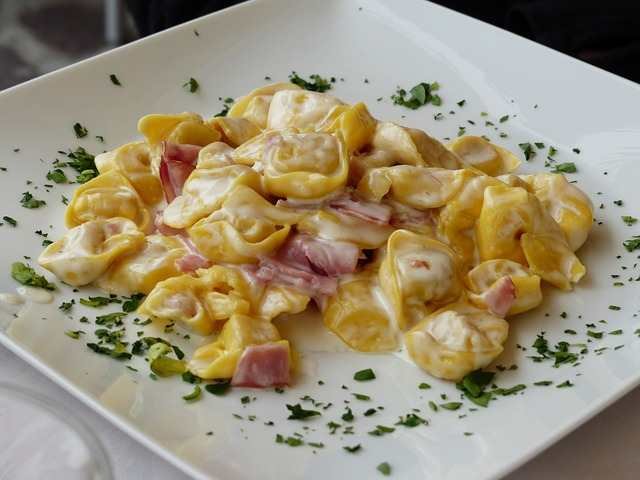
As you might know very well, in Italian nouns can be masculine, feminine or, in some cases they can be both.
Some nouns have the same meaning even if their gender changes. For example, the word impiegato means male clerk, the word impiegata means female clerk.
However, some other Italian nouns change their meaning according to their gender.
So, let’s see ten Italian masculine and feminine nouns that have a different meaning.
IL BANCO, LA BANCA
The first masculine and feminine nouns we’ll study today are banco and banca.
Banco can mean different things in Italian, it can mean school desk, group, work bench, etc…
Examples:
Il mio banco è troppo basso per me
My school desk is too short for me
Abbiamo nuotato vicino a un banco di pesci
We swam near a school of fish
Banca, instead means only bank in Italian.
Example: Oggi sono andata in banca a prelevare 1.500 euro
Today I went to the bank to withdraw 1,500 euros
IL MENTO, LA MENTA
Mento in Italian means chin while menta means mint.
Examples:
Mi gratta il mento
My chin itches
Ho bevuto un tè alla menta
I drank mint tea
IL PERO, LA PERA
Other two peculiar Italian masculine and feminine nouns are pero and pera.
Pero in Italian means pear tree while pera is its fruit, the pear. However, in slang Italian pera can also mean drug shot – it can be used in some sentences also ironically to indicate that someone seems a little crazy or is talking nonsense.
Examples:
Quello là è un pero
That is a pear tree
Per merenda mangerò una pera
I’ll have a pear for snack
Oh, ma ti sei fatto una pera? Oggi spari un sacco di cavolate!
Hey, did you get a drug shot? You’re talking a lot of nonsense today!
IL GAMBO, LA GAMBA
Gambo means stem in Italian while gamba means leg.
Examples:
Del sedano si mangia solo il gambo
You eat only the stem of the celery
Oggi mi fa male la gamba
Today my leg hurts
IL FOGLIO, LA FOGLIA
Foglio can mean sheet of paper or, in same cases, layer. Instead, foglia means leaf.
Examples:
Passami un foglio di carta, per favore
Give me a sheet of paper, please
Guarda che bella é questa foglia di acero
Look how beautiful is this maple leaf
LO SCALO, LA SCALA
In Italian scalo is what many travellers do at least once in their life. In fact, in Italian scalo means stopover.
Instead, scala is an object that it’s better to have at home since it might come in handy. Scala means ladder in Italian.
However, it can also mean staircase, and scale.
Examples:
Farò scalo a Madrid
I’ll have a stopover in Madrid
Ho comprato una scala nuova
I’ve bought a new ladder
IL MOSTRO, LA MOSTRA
In Italian mostro can have two different meanings. It can mean both monster and genius, prodigy.
Examples:
Guarda! Il mostro di Loch Ness!
Look! Loch Ness monster!
E’ un mostro in matematica
S/he’s a genius in maths
Mostra, instead, means a totally different thing. It means show, exhibition.
Example: Ieri sono andata ad una mostra di Caravaggio
Yesterday I went to an exhibition about Caravaggio
LO SCOPO, LA SCOPA
Scopo in Italian means purpose, while scopa means both broom and scopa, a famous Italian card game.
Examples:
Qual è il tuo scopo nella vita?
What’s your purpose in life?
Prendi una scopa e pulisci la tua camera
Take a broom and clean your room
IL PIZZO, LA PIZZA
In Italian pizzo can mean both lace and a sum of money paid to the mafia either to get their protection or to avoid being threaten or hurted by them.
Pizza, instead is famous all over the world and it’s a typical Italian dish.
Examples:
Questo pizzo è fatto a mano
This lace is handmade
La mafia chiede il pizzo
The Mafia asks for pizzo
Prendo una pizza ai quattro formaggi
I’ll take a four cheese pizza
IL SOFFITTO, LA SOFFITTA
The last masculine and feminine Italian nouns you’ll learn today are soffitto and soffitta.
Soffitto in Italian means ceiling while soffitta means attic.
Examples:
C’è una macchia sul soffitto
There’s a stain on the ceiling
C’è un topo in soffitta
There’s a mouse in the attic
Did you already know these ten Italian masculine and feminine nouns? Can you come up with some other Italian nouns like these?
Credits
Original image by Bress-Hamiti




 Traditional Italian sweets for Christmas
Traditional Italian sweets for Christmas

